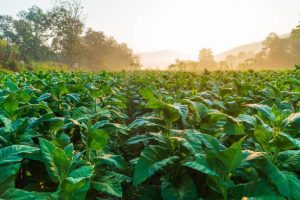The World Health Organisation (WHO) has urged governments to stop subsidising tobacco farming.

Dr Tedros Ghebreyesus, the WHO Director-General, made the call on Friday, May 26, 2023, in a statement in a message ahead of the World No Tobacco Day, celebrated every May 31.
Ghebreyesus said that tobacco is responsible for eight million deaths a year, yet governments across the world spend millions supporting tobacco farms.
“By choosing to grow food instead of tobacco, we prioritise health, preserve ecosystems, and strengthen food security for all,’’ Ghebreyesus said.
He said 300 million people globally are faced with acute food insecurity.
The WHO boss said that meanwhile more than three million hectares of land across more than 120 countries are being used to grow deadly tobacco, even in countries where people are starving.
“A new WHO report, ‘Grow food, not tobacco’ highlighted the ills of tobacco growing and the benefits of switching to more sustainable food crops for farmers, communities, economies, the environment, and the world at large.
“The report also exposes the tobacco industry for trapping farmers in a vicious cycle of debt, propagating tobacco growing by exaggerating its economic benefits and lobbying through farming front groups,’’ he said.
Ghebreyesus said that tobacco farming causes diseases to the farmers themselves and more than one million child laborers are estimated to be working on tobacco farms, missing their opportunity for education.
Dr Ruediger Krech, the Director of Health Promotion, WHO, said tobacco was not only a massive threat to food insecurity, but health overall, including the health of tobacco farmers.
“Farmers are exposed to chemical pesticides, tobacco smoke and as much nicotine as found in 50 cigarettes leading to illnesses like chronic lung conditions and nicotine poisoning,’’ Krech said.
“Tobacco growing is a global problem. The focus has so far been in Asia and South America, but the latest data show tobacco companies are expanding to Africa.
“Since 2005, there has been a nearly 20 per cent increase in tobacco farming land across Africa,’’ he said.
According to him, the WHO, Food and Agriculture Organisation and the World Food Programme support the Tobacco Free Farms initiative that would provide help to more than 5000 farmers in Kenya and Zambia.
He said that such initiative would help to grow sustainable food crops instead of tobacco.
Krech said that every year World No Tobacco Day honours those making a difference in tobacco control.
He said that in 2023, one of the awardees, Ms Sprina Chacha, a female farmer from Kenya, would be recognised for not only switching from growing tobacco to high protein beans,
According to him, Chacha also was training hundreds of other farmers on how to do this to create a healthier community.
He said that 182 parties to the WHO Framework Convention on Tobacco Control have committed to“ promote economically viable alternatives for tobacco workers and growers’’.
“A crucial way that countries can fulfill this obligation is by ending subsidies for tobacco growing and supporting healthier crops.
“By choosing to grow food instead of tobacco, we prioritise health, preserve ecosystems, and increase food security,’’ he said.
The 2023 theme is “We need food, not tobacco.’’
By Franca Ofili
